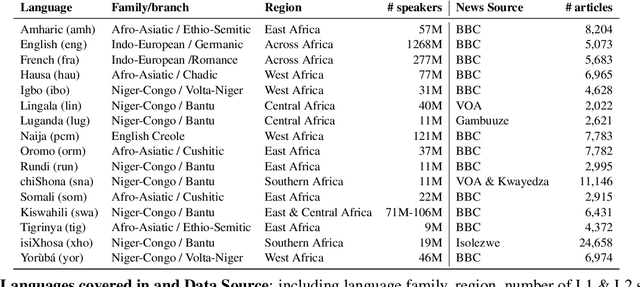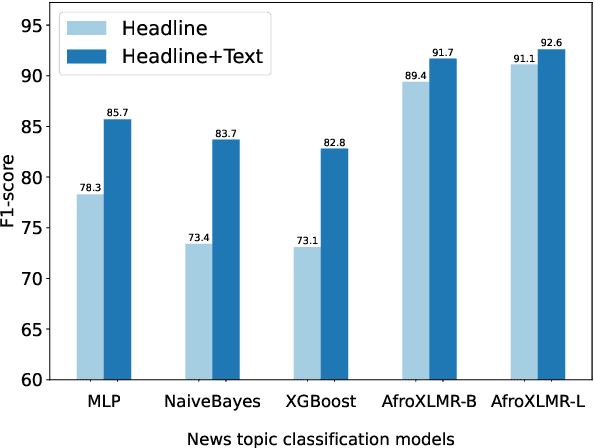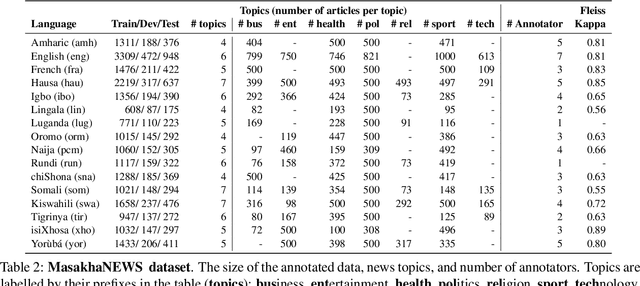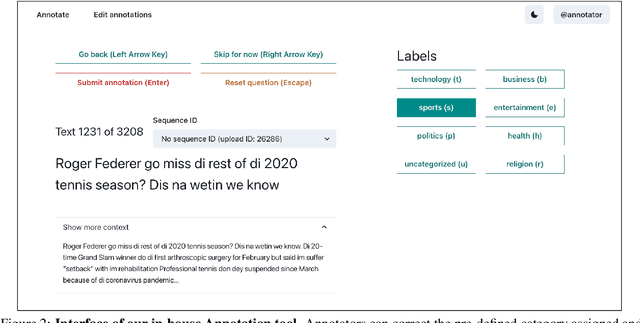Samuel Fanijo
MasakhaNEWS: News Topic Classification for African languages
Apr 19, 2023



Abstract:African languages are severely under-represented in NLP research due to lack of datasets covering several NLP tasks. While there are individual language specific datasets that are being expanded to different tasks, only a handful of NLP tasks (e.g. named entity recognition and machine translation) have standardized benchmark datasets covering several geographical and typologically-diverse African languages. In this paper, we develop MasakhaNEWS -- a new benchmark dataset for news topic classification covering 16 languages widely spoken in Africa. We provide an evaluation of baseline models by training classical machine learning models and fine-tuning several language models. Furthermore, we explore several alternatives to full fine-tuning of language models that are better suited for zero-shot and few-shot learning such as cross-lingual parameter-efficient fine-tuning (like MAD-X), pattern exploiting training (PET), prompting language models (like ChatGPT), and prompt-free sentence transformer fine-tuning (SetFit and Cohere Embedding API). Our evaluation in zero-shot setting shows the potential of prompting ChatGPT for news topic classification in low-resource African languages, achieving an average performance of 70 F1 points without leveraging additional supervision like MAD-X. In few-shot setting, we show that with as little as 10 examples per label, we achieved more than 90\% (i.e. 86.0 F1 points) of the performance of full supervised training (92.6 F1 points) leveraging the PET approach.
Masakhane-Afrisenti at SemEval-2023 Task 12: Sentiment Analysis using Afro-centric Language Models and Adapters for Low-resource African Languages
Apr 13, 2023



Abstract:AfriSenti-SemEval Shared Task 12 of SemEval-2023. The task aims to perform monolingual sentiment classification (sub-task A) for 12 African languages, multilingual sentiment classification (sub-task B), and zero-shot sentiment classification (task C). For sub-task A, we conducted experiments using classical machine learning classifiers, Afro-centric language models, and language-specific models. For task B, we fine-tuned multilingual pre-trained language models that support many of the languages in the task. For task C, we used we make use of a parameter-efficient Adapter approach that leverages monolingual texts in the target language for effective zero-shot transfer. Our findings suggest that using pre-trained Afro-centric language models improves performance for low-resource African languages. We also ran experiments using adapters for zero-shot tasks, and the results suggest that we can obtain promising results by using adapters with a limited amount of resources.
 Add to Chrome
Add to Chrome Add to Firefox
Add to Firefox Add to Edge
Add to Edge